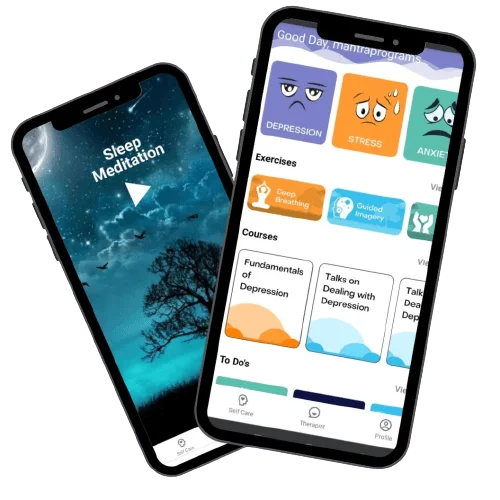Do you feel like you can’t go a day without checking your social media accounts? If so, you’re not alone. Social media has become an integral part of our lives, and it’s hard to resist the temptation to check Facebook, Twitter, and Instagram every hour. However, for people with OCD, this can be a major problem. In this blog post, we will discuss social media and OCD in detail. We will explore how OCD affects social media use, and we will offer tips on how to reduce your social media intake.
Contents
OCD And Its Affects on Life
Obsessive-Compulsive Disorder or OCD is a mental health disorder that causes individuals to have persistent and recurring thoughts, impulses, or images that are intrusive and cause anxiety or distress. People with OCD often feel the need to perform certain rituals or routines in order to ease their anxiety. These rituals can take up a lot of time and can interfere with daily life.

- OCD can cause people to miss work or school due to the time it takes to perform rituals.
- It can also cause relationship problems, as OCD can be very demanding and take up a lot of time and energy.
- People with OCD may avoid social situations for fear of their rituals being exposed.
- In severe cases, OCD can lead to isolation and depression.
Some people with OCD may obsessively check their social media accounts in order to ease their anxiety. This can lead to spending hours on social media every day, which can interfere with work, school, and personal relationships. Additionally, this behavior can also lead to feelings of isolation and loneliness.
Impact of Social Media on OCD
Helping Hand of Social Media
Even though social media has many negative impacts on people suffering from OCD, it can help with the disorder if used in the right way.
The positive impacts of social media on obsessive-compulsive disorder are as follows:
- Social media can be used to connect with others who have the disorder. This can provide support and understanding.
- Additionally, social media can be used to raise awareness about OCD and mental health disorders.
- It can help people with OCD share their experiences and connect with others who understand what they are going through.
- Social media can also be used to educate others about OCD and mental health disorders.
- Finally, social media can help people with OCD feel less alone and more connected to the world.

Drawbacks of Social Media
There are many ways that social media can trigger OCD. For example, social media can cause people to compare themselves to others, which can lead to feelings of inadequacy and low self-esteem. Social media can also be a source of anxiety and stress, as users may feel like they need to respond to messages and notifications immediately. Social media can be a source of anxiety and stress. This is particularly true for people with OCD, as they may feel like they need to respond to messages and notifications immediately.
Because aspects of social media and OCD can be quite similar, sometimes social media usage can exacerbate OCD. Because of this, it is particularly important for people with existing mental health concerns to use the Internet wisely. When people see others constantly checking their phones or engaged in other rituals, they may think that this behavior is normal. This can make it harder for people with OCD to seek help, as they may not realize that their behaviors are abnormal.
Additionally, social media can be overwhelming for people with OCD. There is so much information available that it can be hard to process everything. This can lead to anxiety and distress. Social media can lead to isolation, as people with OCD may avoid social situations for fear of their rituals being exposed. Additionally, this behavior can also lead to feelings of isolation and loneliness.
How to Reduce Your Social Media Usage/Addiction
If you are concerned about the amount of time you are spending on social media, there are some steps you can take to reduce your intake.
Time Conscious
First, try to be aware of how much time you are spending on social media. If you find that you are spending hours every day scrolling through your feed, it may be time to cut back. Start with cutting out time gradually by 20-30 minutes and slowly increase the time cut. Once you start, managing time, you can use the saved time for other better opportunities. Try out learning a new language, or reading a new book. Invest your time nicely.
Set Limits
Second, set limits for yourself. The limits can be in the terms of the time that you spend on social media. For example, you could allow yourself to check social media for a maximum of 30 minutes per day. Once you reach your limit, log off and do something else. These limits will gradually help you stay away from social media. It might be hard initially, but gradually you will be used to it.
Avoid When Stressed
Third, try to avoid using social media when you are feeling anxious or stressed. This will only make your symptoms worse. Certain people start scrolling their Instagram when anxious or stressed out. In fact, they do not even see the feeds, they just keep scrolling through and it can prove to be a bad idea. Instead, when stressed, try to meditate and breathe deeply to calm yourself.
Ensure Breaks
Fourth, make sure to take breaks from social media throughout the day. Take a few minutes to step away from your phone or computer and focus on something else. Try to develop a hobby or interest outside of social media. This will help you focus on something other than your feed and give you something. You can try out writing, bicycling, playing soccer, and photoshoots, there is an endless number of constructive hobbies that you can adopt in your life.
Finally, remember that social media is not real life. Do not compare your life to the highlight reel that you see on Instagram or Facebook. Everyone has ups and downs, and no one’s life is perfect.
Can Technology Impact Mental Health Disorders
Yes, the growing technology dependence is definitely a concern for OCD. As mentioned earlier, social media can be a trigger for OCD symptoms. If people are constantly exposed to images and videos of other people engaged in rituals, it can make their own OCD worse. Additionally, if people with OCD spend too much time on social media, they may start to isolate themselves from real-life social situations. This can lead to further anxiety and distress.
If you are concerned about your technology usage, there are some steps you can take to reduce your intake (as mentioned above). It is also important to talk to a mental health professional if you are struggling with OCD or another mental health disorder.
Conclusion
Social media can be a major trigger for people with OCD. If you find that you’re spending too much time on social media, try to set limits for yourself and be more mindful of why you’re using it. Additionally, make sure to take breaks from your phone and spend time with loved ones. If you’re struggling with OCD, there are many resources available to help you cope with the disorder.
There is no doubt that social media has become a huge part of our lives. For some people, it can be hard to resist the temptation to check their accounts every hour. However, for people with OCD, this can be a major problem.
To get help from us, book an online therapy or you can download our free OCD treatment app on Android or iOS.



